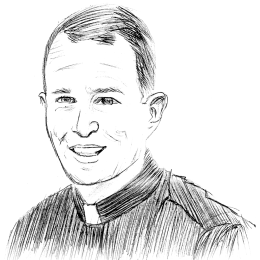 The life of a university is filled with words. We professors use them constantly, putting one after another for hours on end in our lectures, hoping to communicate the wisdom and knowledge our research and study have produced. We assign hundreds, or sometimes thousands of pages of reading, again filled with words. Frequently, we require our students to respond to what they have read or heard, and we often ask them to do so instantaneously, in carefully worded blog posts or short papers or class discussions. And by the end of the semester, we ask them to synthesize the material we have covered with bluebook essays or go beyond it with long research papers.
The life of a university is filled with words. We professors use them constantly, putting one after another for hours on end in our lectures, hoping to communicate the wisdom and knowledge our research and study have produced. We assign hundreds, or sometimes thousands of pages of reading, again filled with words. Frequently, we require our students to respond to what they have read or heard, and we often ask them to do so instantaneously, in carefully worded blog posts or short papers or class discussions. And by the end of the semester, we ask them to synthesize the material we have covered with bluebook essays or go beyond it with long research papers.
There is good pedagogical reason for much of this use of words, in terms of both efficient communication and the learning process. But lately I have been struck by the downside of the deluge of words that characterize our lives. We can easily find ourselves overwhelmed, and often we take evasive measures. Rather than diving deeply, we skim across the surface. We perfect the art of speed reading and facile responses. We flip between ideas as easily as channels on television or updates on Twitter, taking comfort in keeping our distance.
In this new semester — which I know will once again be filled with words read and words heard and words spoken — I have begun to think about how to better cultivate a space for silence in my classes and activities. I know that for myself, I need a time not constantly filled with new words when I can reflect on what I read and hear, letting the best and most important ideas and experiences rise to the top and letting others fall away. Maybe you have felt the same way, especially as you look at your new syllabi and full planners that now can seem so ambitious and daunting.
Our Jesuit tradition teaches us that a great deal happens in silence. Silence — the time between hearing and speaking, between learning and responding — is when we really learn. It allows us to reflect on and integrate all the words we have heard and read. We savor and turn over in our heads intriguing new concepts or visions, letting them capture our imagination and live within us. A passage from a poem, an equation, a powerful formulation of the meaning of justice or an open-ended question about God that keeps beckoning on the horizon of our consciousness — each of these deserves our attention and time-rich reflection. When we linger over them in silence, they become part of us, and they inform our newly emerging, always-provisional yet ever-growing understandings of ourselves and our world.
Silence is just as important in our friendships and relationships. We hear so much from one another (and about one another), whether on Facebook or on Twitter or in Leo’s or at a party, and we can feel a need to instantly have an opinion, immediately render a judgment and proclaim it to the world. But silence calls us to simply listen. It helps us to hear persons, rather than events. It provides the space to reverence each person in his or her wounds and triumphs and allows said person to speak his or her truth — sometimes in words, sometimes in silence — rather than answer our questions. We grow together as much through the words that go unspoken as the ones that are said.
And finally, silence prepares us to have a meaningful word to speak when the right time comes. It helps us find the words that matter, words we can believe in, whether in our classes or papers, friendships or decisions about our future career. Rather than responding generically or safely, we speak the truth as we have come to know it. We can name our deepest convictions; we can embrace our passions; we can proclaim our loves — all precisely because we have lived them deeply and chosen them carefully in our silent reflection.
As we dive once more into this word-laden ocean of the semester, let’s preserve a space for silence, for reverent reflection: The kind of contemplation that gives meaning to our action.
Fr. Matthew Carnes, S.J., is an assistant professor in the government department. He is one of the
alternating writers for AS THIS JESUIT SEES IT … which appears every other Friday.








